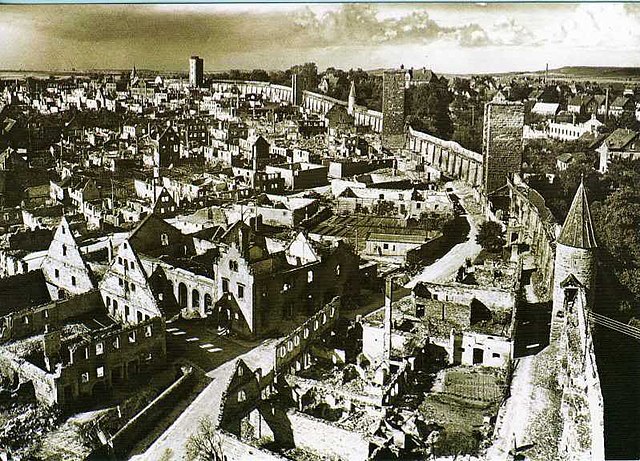WWII History of Rottenburg Ob der Tauber
from wiki
Modern era[edit]
Rothenburg held a special significance for Nazi ideologists. For them, it was the epitome of the German 'Home Town', representing all that was quintessentially German. Throughout the 1930s, the Nazi organisation KDF (Kraft durch Freude) "Strength through Joy" organized regular day trips to Rothenburg from all across the reich. This initiative was staunchly supported by Rothenburg's citizenry – many of whom were sympathetic to National Socialism – both for its perceived economic benefits and because Rothenburg was hailed as "the most German of German towns". In October 1938, Rothenburg expelled its Jewish citizens, much to the approval of Nazis and their supporters across Germany.[3]
The creation of an ideal Nazi community reminded the peoples of Germany of the way the Nazis wanted them to live as a family and as a community; Rothenburg simply exemplified this Nazi ideology as an idealised family life. Additionally, other German towns followed the 'example' set by Rothenburg for the Nazis, this began a trend of Nazi German Nationalism which led to the creation of an "ideal" Nazi community in Rothenburg. This then grew to reveal the ideal Nazi family, as illustrated in propaganda of the time. This ideal lifestyle was taken further when an approved upbringing for the sons of Nazi Germany was introduced, first growing up in a Nazi or Hitler Youth organization, then protecting the ideals of both Nazi Germany and the Fuhrer Adolf Hitler as a civilian or as military personnel, thus forming the core idea of Nazi patriotism, protecting their own beliefs. In many ways, Rothenburg demonstrated key elements of Nazi ideology and epitomised their desire to expand National Socialist thinking throughout Germany and in all areas with German-speaking people across Europe.

In March 1945 in World War II, German soldiers were stationed in Rothenburg to defend it. On March 31, bombs were dropped over Rothenburg by 16 planes, killing 37 people and destroying 306 houses, six public buildings, nine watchtowers, and over 2,000 feet (610 m) of the wall. The U.S. Assistant Secretary of War John J. McCloy knew about the historic importance and beauty of Rothenburg, so he ordered US Army General Jacob L. Devers not to use artillery in taking Rothenburg. Battalion commander Frank Burke (Medal of Honor) ordered six soldiers of the 12th Infantry Regiment, 4th Division to march into Rothenburg on a three-hour mission and negotiate the surrender of the town. First Lieutenant Noble V. Borders of Louisville, Kentucky, First Lieutenant Edmund E. Austingen of Hammond, Indiana, Private William M. Dwyer of Trenton, New Jersey, Private Herman Lichey of Glendale, California, Private Robert S. Grimm of Tower City, Pennsylvania, and Private Peter Kick of Lansing, Illinois were sent on the mission. When stopped by a German soldier, Private Lichey, who spoke fluent German and served as the group’s translator, held up a white flag and explained, “We are representatives of our division commander. We bring you his offer to spare the city of Rothenburg from shelling and bombing if you agree not to defend it. We have been given three hours to get this message to you. If we haven’t returned to our lines by 1800 hours, the town will be bombed and shelled to the ground.”[4] The local military commander Major Thömmes gave up the town, ignoring the order of Hitler for all towns to fight to the end and thereby saving it from total destruction by artillery. American troops of the 12th Infantry Regiment, 4th Division occupied the town on April 17, 1945, and in November 1948, McCloy was named Honorable Protector (German: Ehrenbürger) of Rothenburg. After the war, the residents of the city quickly repaired the bombing damage. Donations for the rebuilding were received from all over the world. The rebuilt walls feature commemorative bricks with donor names. Traffic-reducing measures were put in place in a significant portion of Rothenburg to increase safety and accommodate tourism.
https://en.wikipedia.org/wiki/Rothenburg_ob_der_Tauber